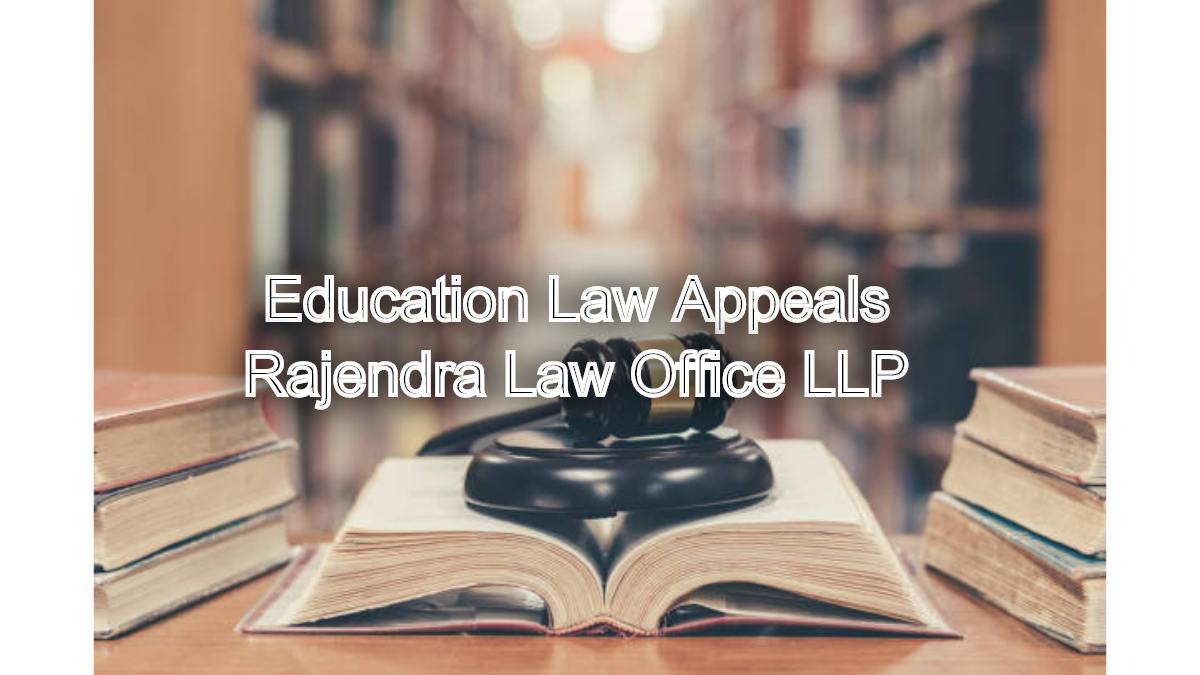Education Law Appeals: The education sector in India is a dynamic and ever-evolving field. However, it is not immune to disputes and conflicts. Whether it’s a disagreement over admissions, fee structures, or academic policies, students, parents, and educational institutions may find themselves entangled in legal battles. In such cases, appealing to higher courts, particularly the Supreme Court of India, can be a crucial step to seek justice and ensure fair treatment.
Education Law Appeals: Appealing Educational Disputes in Supreme Court: Rajendra Law Office LLP
Understanding the Appeal Process in Education Law
The appeal process in education law involves filing a petition before the appropriate appellate court, which could be a High Court or the Supreme Court. The petition must clearly outline the grounds for appeal, the specific issues to be addressed, and the relief sought.
The Supreme Court of India, as the apex court, has the power to review decisions of lower courts and provide final judgment. It plays a significant role in shaping education policy and ensuring that educational institutions adhere to legal norms and regulations.
Common Grounds for Appeal in Education Law
Several common grounds for appeal in education law include:
- Violation of Fundamental Rights: If a student’s fundamental rights, such as the right to education or the right to equality, are violated.
- Errors of Law: If the lower court has made errors in interpreting and applying the relevant laws and regulations.
- Factual Errors: If the lower court has made errors in assessing the facts of the case.
- Procedural Irregularities: If the lower court has not followed proper procedures or has violated principles of natural justice.
- Discriminatory Practices: If the educational institution has engaged in discriminatory practices based on caste, religion, gender, or other factors.
The Role of Rajendra Law Office LLP in Education Law Appeals
Rajendra Law Office LLP, a renowned law firm in Chennai, specializes in education law and has a proven track record in handling complex education law appeals. Their team of experienced lawyers is well-versed in the intricacies of education law and has a deep understanding of the legal framework governing the education sector.
Key services provided by Rajendra Law Office LLP in education law appeals include:
- Legal Consultation: Providing comprehensive legal advice on the merits of the case and the potential grounds for appeal.
- Drafting Appeals: Preparing well-crafted appeals, ensuring adherence to legal formalities and procedural requirements.
- Representing Clients in Court: Representing clients before the High Court and Supreme Court, advocating for their rights and interests.
- Research and Analysis: Conducting thorough legal research to identify relevant case laws and legal precedents.
- Strategic Planning: Developing effective legal strategies to maximize the chances of a successful appeal.
Why Choose Rajendra Law Office LLP for Your Education Law Appeal?
- Expertise: Their team of experienced lawyers possesses in-depth knowledge of education law and has a strong understanding of the legal nuances.
- Track Record: They have a proven track record of successfully handling education law appeals and securing favorable outcomes for their clients.
- Client-Centric Approach: They prioritize client needs and provide personalized legal services.
- Strong Advocacy: They are skilled advocates who can persuasively argue your case before the court.
- Commitment to Justice: They are committed to upholding the principles of justice and ensuring fair treatment for all.
FAQs: Education Law Appeals
Common grounds for appealing an education-related decision include:
Violation of fundamental rights
Errors of law or fact
Procedural irregularities
Discrimination
Unfair treatment
The duration of an education law appeal can vary depending on various factors, such as the complexity of the case, the workload of the courts, and the specific procedures involved. In general, it can take several months or even years to reach a final decision.
The costs associated with filing an education law appeal can include court fees, legal fees, and other expenses. The specific costs may vary depending on the jurisdiction and the complexity of the case. It’s advisable to consult with a lawyer to get an accurate estimate of the costs involved.
While it is possible to represent oneself in an education law appeal, it is generally advisable to hire a lawyer. A lawyer can provide expert legal advice, handle complex legal procedures, and effectively advocate for your rights.
When choosing a lawyer for an education law appeal, consider the following factors:
Experience and expertise in education law
Reputation and track record
Communication skills and responsiveness
Fees and billing practices
Compatibility with your personality and communication style
Conclusion
Navigating the complex legal landscape of education law can be daunting. With the assistance of experienced legal professionals like those at Rajendra Law Office LLP, individuals and institutions can effectively appeal educational disputes and seek justice. By understanding the appeal process, identifying strong legal grounds, and engaging the services of a reputable law firm, it is possible to achieve favorable outcomes in education law appeals.
Read More
- Corporate Law Appeals: Appealing corporate law disputes
- Appeals in Financial Fraud Cases: Handling financial fraud appeals
- Appeals in Civil Rights Cases: Appealing civil rights violations cases
- Consumer Protection Appeals: Appealing consumer rights decisions
- Real Estate Dispute Appeals: Appealing real estate disputes
- Ministry of Education:

